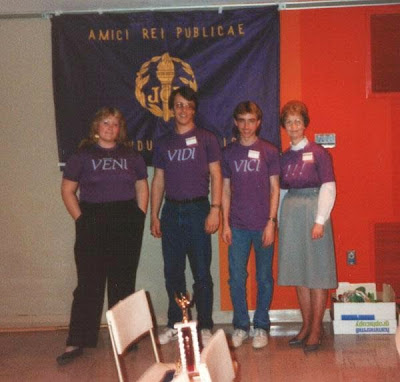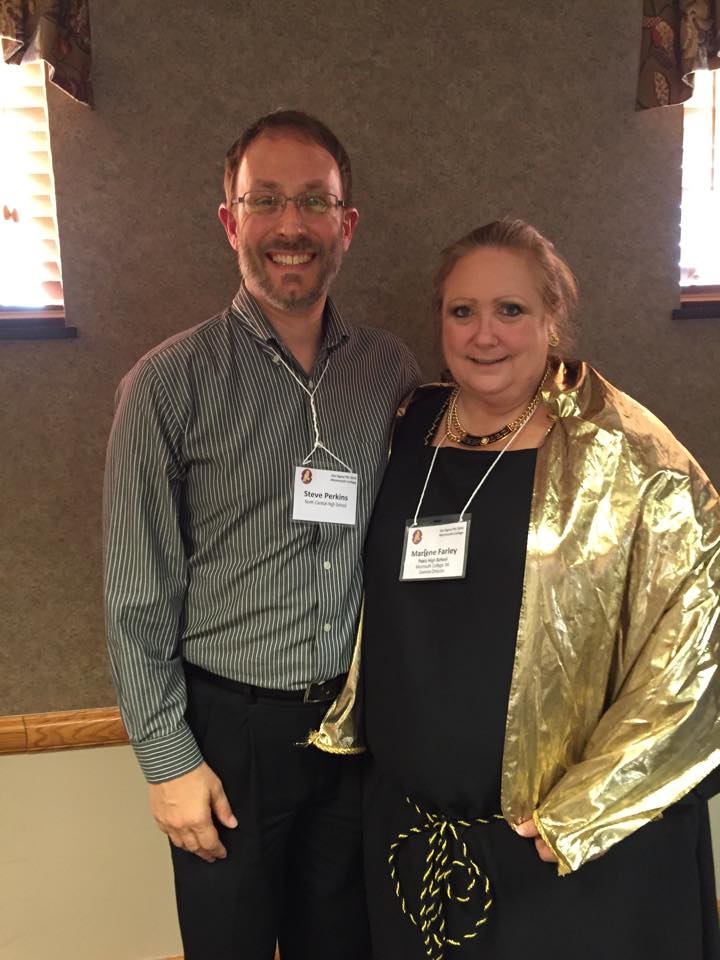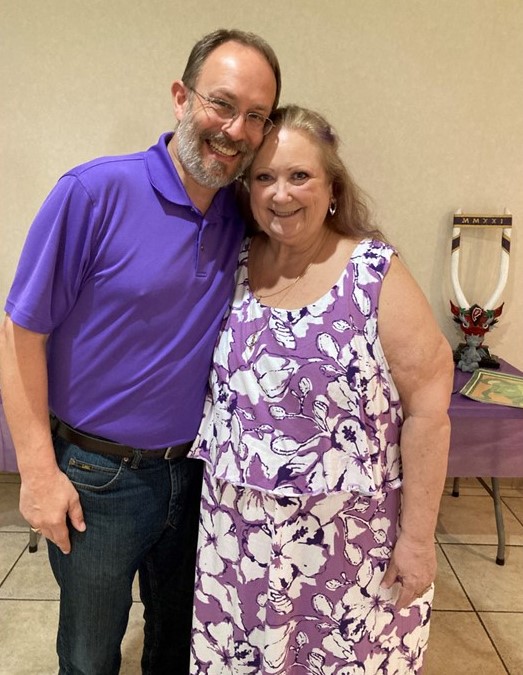I recently thought I had fallen into a real life version of a
Dan Brown novel or the Nicholas Cage move
National Treasure. As I scrolled through some of my picture uploads on Facebook, I found one of the title page of a book I had forgotten I owned. I knew instantly where the book was, and given what it was, I could hardly wait to pull it from its shelf. When I did, I discovered something even more amazing.
My Currently Favorite Collection
I am not a huge collector of things, but I have enjoyed collecting
fountain pens, miniature Mustang cars, and the complete discography of certain rock and metal artists. My favorite collection at the moment, however, is of English translations of Vergil's
Aeneid. In the fall of 2021, I launched a
website listing every English translation of the epic poem in chronological order from the first in 1513 to the most recent. I wrote about that website in a post called "
Mr. Holland's Aeneid," which explains that the new website
Aeneid Translator would include a color-coded system to indicate the translations that I actually own. Until recently, my collection totaled thirty-seven translations, including every one from 1937 through 2021. Just the other day, that total climbed to thirty-eight.
As I was scrolling through some old pictures on Facebook, I ran across one from the title page to a translation of the works of Vergil. Since the picture was in my photos, I realized that I must own the book and immediately remembered
not only that I did own it, but where it was in my bookcases. I ran to that particular bookcase, pulled off the volume, and began to explore what I had.
The Excitement of Discovery
The oldest translation of Vergil's
Aeneid in my possession is the 1685 translation by John Dryden, but it is a 20th century edition. Prior to my recent discovery, I had thought the oldest volume in our personal library was the 1794 edition of Cicero's
De Oratore that I had purchased at an antiquarian bookshop in Florence, Italy. This forgotten edition of Vergil published in 1770 bested that by twenty-four years.
It is the dream of book lovers to discover a long lost work. Indeed, this idea forms the core of one of the best-selling books of all time, Umberto Eco's
The Name of The Rose, but let us be clear. I did not unearth on a bookshelf in my Indiana home the lost second book of Aristotle's
Poetics. Still, just as children enjoy dressing up and playing as their favorite literary or movie characters, so I enjoyed the thrill of discovery when I realized just how old this volume was and what it contained.
As you can see from the title page in the picture above, this book contains the prose translation of Vergil's works. It is, in fact, the first of two volumes (someday, perhaps, I will procure the second), that cover all of the Roman poet's works, the Eclogues, the Georgics, and the Aeneid. The prose rendering is that of Joseph Davidson, originally published in 1743. As you can see from the opening page to the first book of the Aeneid, this is more than a simple translation.

Each page contains the Latin text, a section titled Ordo that puts the Latin into more traditionally English word order, Davidson's prose translation, and then copious notes. After the double discovery of the oldest book in my library and a translation of Vergil I did not remember I had, a third thrill of excitement came when I noticed that in Davidson's comparison of the opening lines of the Aeneid with those of Homer's Odyssey, he cited Alexander Pope's translation after giving the Greek. I have a good friend who is Beowulf fan, and he and I love to tease each other about who was the better poet, the Beowulf bard or Alexander Pope. For my money, Pope will always win. I have loved his heroic couplets since I was a senior in high school, and his translation of Homer, particularly the Iliad, is one of my favorite works of all time.
 |
| Holding a first edition of Pope's Iliad translation from 1715 |
These discoveries alone would have been enough to excite a bibliophile, but something even better was hiding in these three-hundred-year-old pages.
The Chief Design of Education
At the beginning of his book, Davidson includes an essay "To Those Gentlemen Who have the immediate Care of Education," and in it he lays out an understanding of education that has been held in various degrees by most people in most cultures, is espoused and practiced by some of us today, but has for too many others become a lost treasure.
Davidson refers to those of us who are teachers as "faithful guides, who, no doubt, will, in whatever author you teach, guard your pupils against the influence of any thing that has a tendency to corrupt their principles or morals" and then goes on to show why Vergil is such a suitable author for this purpose. According to Davidson, "There is a peculiar tenderness and humanity diffused through all his writings, which never fails to make the heart better, and sends away every well disposed mind from the reading of him, equally pleased and improved. He animates the soul to the love of virtue, by setting before us the most noble examples; corrects the passions, by showing their fatal effects, when indulged to excess, or when directed to improper objects; makes us feel the peace and serenity they bring, when conducted by reason, and regulated within the bounds of prudence and moderation. From him we learn the force of piety, and what powerful incentives to fortitude, and every heroic virtue, arise from the belief of a deity, and a providence supremely wise and good. In a word, every image, every description, every character he exhibits; his fables, his allegories, his episodes, all are calculated, not only to please the fancy, but to instruct the judgment, and form the heart."
If that sounds quaint, outdated, or even inappropriate for the modern classroom, we have sad proof of how far we have drifted from the true purpose of education. It is about far more than teaching mere facts, the sufficient memorization of which can be determined by an exam, and Davidson states this pointedly. "To teach boys to understand an author's language, is, you know, but the least part of your duty. To acquaint them with his spirit and virtuous design, to form their taste aright, that they may be able to correct his faults and relish his beauties, feel the force of his pious or humane sentiments, and learn to copy out his heroic characters, and imitate his generous examples; in a word, to teach them to be sound critics on life and manners and to distinguish the true from the false, ... this is your honourable province, and the chief design of education."
Isn't that asking too much of our teachers? It is if we insist on placing foolish burdens on them under the guise of professionalism. Earlier in his essay Davidson had explained why he had produced this particular edition of Vergil's works. "If it gives you some relief from the more disagreeable and burdensome part of your work, it is only to leave you freer and more disengaged in the execution of what is the principal business of education." Davidson knew, as have most people in most societies through the ages, that education is a grander enterprise than the mechanical drudgery into which it can be corrupted. He went on to say, "You, by your very profession, are solemnly engaged to teach and exemplify goodness to mankind, at a time of life when they are most capable of being taught, when their docile minds may easily be moulded to every shape of goodness, and are susceptible of the most durable impressions. [T]he legislature may enact, and the magistrate may execute salutary law; but what will all avail, unless the foundations of national virtue be laid in the right forming of the heart at first? If the fountains be foul and impure, all the art of man will not make the streams run pure and unpolluted. The Scripture tells us, that the tree must first be made good, and then its fruits will be good also; but if the tree be corrupt, the fruit likewise will partake of the corruption. Indeed experience shows us, that the best education is not of itself sufficient to establish the mind in an habitual, uniform course of integrity; yet the same experience evinces, that nothing is of so much importance towards effecting this great end, as to give the mind an early turn and bias to the right side; and that, without this, all other means, humanly speaking, will have but a weak and transient influence."
The legislature may enact, and the magistrate may execute salutary law; but what will all avail, unless the foundations of national virtue be laid in the right forming of the heart at first? What, indeed.





















